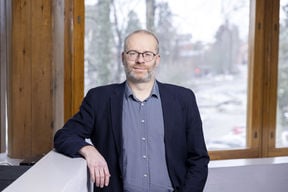What do you research and why?
I do medical image analysis, which means using computers to automatically analyse medical scans, like MRI or CT scans. What we try to do is measure things from the images, for instance the size or the shape of structures such as the heart, the skull, or specific regions in the brain. This is helpful, for instance, if you want to know how the brains of people with a certain disease differ from healthy people’s brains. It is also useful in drug trials or when you are evaluating new therapies.
The really difficult part is to take that idea from group studies, where you analyse differences between groups of people, and apply it to individuals. Let’s say you have one patient who has a disease that needs to be diagnosed or treated. That is a very different kind of a situation than the group study because here you get scans from some hospital and they take images the way they think is best, with different scanners and different settings in their scanners. And these patients are not healthy looking, they might for instance have a big brain tumor. It’s like imaging in the wild compared to a lab setting. For that, we don’t really have proper solutions yet.
How did you become a professor?
I always knew that I wanted to be a professor, or an inventor. I remember seeing a TV programme as a young kid, where there was some guy, an inventor who was a professor, and knew that that’s what I wanted to do. Otherwise, the normal way; through the different stages of an academic career.
What is the high point of your career so far?
It is not just one thing. I’m a big music fan, and this is a bit like someone asking you your favourite song. In my Spotify list there are like 300 songs and they are all fantastic!
There’s the research itself, the progress you make and the thrill of discoveries, doing something that nobody has done before. Then of course there is working with young people; every generation is a new wave of talent, you try to filter out the diamonds in the rough, shape them and help them shine. Also, we write a lot of open source software, so I see papers that are published actually using our tools. That is pretty interesting. All of those things, and many more.
What do you expect from the future?
I don’t know what to expect but I know what to hope for. I hope to be able to establish myself and start a successful group here. Of course I want to be connected to the Finnish research community as well as clinical collaborators, while having an international outlook. I want to keep working with my colleagues at Harvard and also be connected to the European research scene.
Professor Koen Van Leemput joined the Department of Neuroscience and Biomedical Engineering on February 1. He also has an affiliation with the Department of Computer Science.





